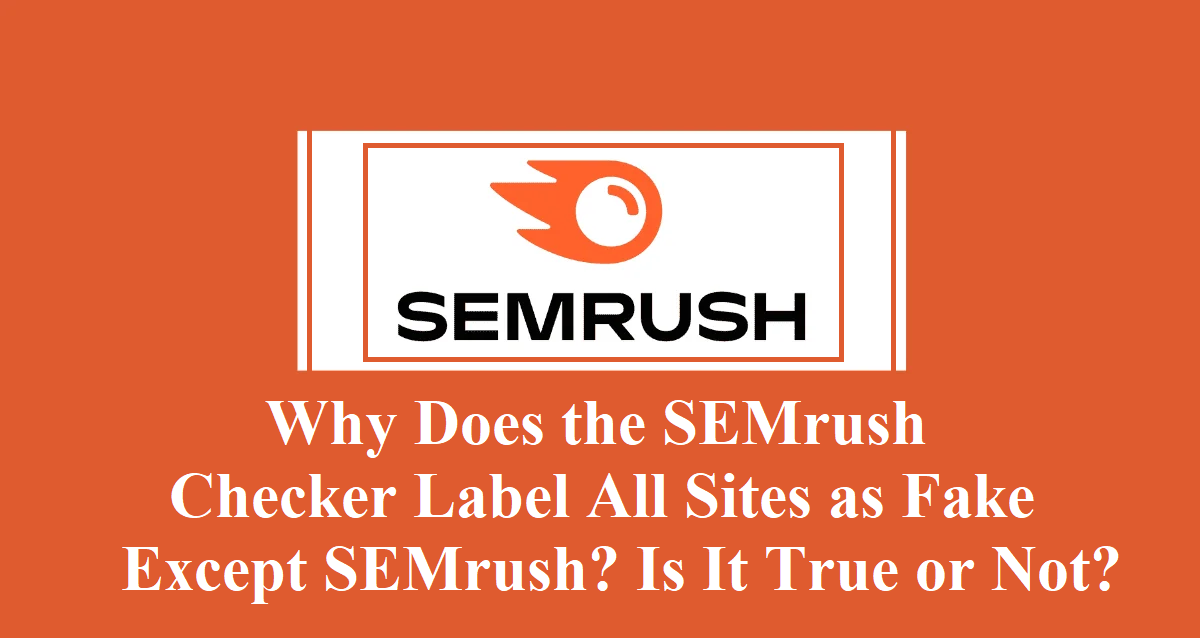User Experiences and Comparison with Competitors
Some users have reported that SEMrush's tools may label certain websites as having "fake" traffic or low-quality metrics. This could stem from its algorithms designed to assess site quality based on various SEO factors, including backlink profiles and traffic sources. Users often compare SEMrush with other SEO tools like Ahrefs and Moz Pro, noting that while SEMrush provides extensive features for keyword research and site audits, it may also be perceived as overly critical of other sites. This has led to speculation that SEMrush might downplay competitors' metrics to promote its own services.Technical Aspects - Algorithmic Analysis
The SEMrush Site Audit tool analyzes numerous factors, including broken links, duplicate content, and technical SEO issues. If a site fails to meet certain criteria, it may be flagged as lower quality or "fake" in comparison to SEMrush's own metrics. There are discussions in forums about the potential for manipulating traffic metrics on platforms like SEMrush, suggesting that some users may attempt to artificially inflate their site's perceived value. This could contribute to the labeling of sites as fake if they detect discrepancies.Are There any Known Issues with SEMrush's Site Audit Tool
There are several known issues with SEMrush's Site Audit tool that users have reported.Common Issues Reported by Users
-
Inconsistent Page Reporting
Some users have experienced problems where the Site Audit tool only reports on a fraction of the pages on their site. A user noted that their audit showed ideas for only 13 out of 19 URLs, despite all being valid pages. This issue has persisted for months, with support acknowledging the problem but not providing a timeline for resolution. -
Crawling Limitations
The Site Audit tool may not crawl all pages due to various configurations. Issues such as robots.txt blocking the crawler, specific exclusions in crawl scope, or pages being behind authentication gates can prevent a comprehensive audit. -
Technical Errors
Users have reported technical problems such as broken links, duplicate title tags, and missing metadata. While these are typical issues flagged by the tool, their significance can vary. Some users find that the tool flags issues that may not be critical or relevant to their site's performance.
SEMRush Interface and Data Reliability
Some users find SEMrush's interface challenging to navigate initially. Although it provides detailed insights, the learning curve can be steep, leading to confusion about which issues are mission-critical and which can be deprioritized. The tool often uses estimated data for traffic and visibility metrics, which can lead to discrepancies between reported figures and actual performance. Users are advised to interpret these metrics cautiously.Recommendations for Improvement
SEMrush's Site Audit tool is powerful and offers valuable insights into technical SEO issues, users should be aware of these limitations and approach its findings with a critical eye. To mitigate some of these issues, users are encouraged to run regular audits and cross-check findings with other tools. This practice helps ensure a more accurate understanding of their site's health and performance. If the Site Audit tool fails to pick up certain URLs, users may need to create new projects or manually upload URLs to ensure comprehensive coverage of their site.How Accurate is SEMrush in Identifying Fake Sites
SEMrush's accuracy in identifying "fake" sites or low-quality domains is a nuanced topic. SEMrush can be a valuable tool for identifying potentially fake sites through its Authority Score and comprehensive audits, users should remain vigilant about discrepancies in data and validate findings with additional resources.-
Data Sources and Methodology
SEMrush utilizes a combination of proprietary data, third-party sources, and search engine information to assess websites. This multifaceted approach allows it to provide insights into keyword performance, backlink profiles, and overall site health. One of the key metrics SEMrush offers is the Authority Score (AS), which evaluates a site's credibility based on various factors. This score can help users determine if a site is potentially "fake" or spammy by analyzing its backlink profile and overall performance.
-
User Experiences
Users have expressed mixed feelings about SEMrush's accuracy. Some report discrepancies between SEMrush's data and their actual site performance, particularly regarding traffic estimates and keyword rankings. A user noted that while SEMrush indicated low search volume for a keyword, they received significant traffic for related content. There are concerns that SEMrush may overly flag certain sites as low quality or "fake," potentially due to its stringent criteria for evaluating SEO metrics. This can lead to confusion among users trying to gauge their site's legitimacy or performance compared to competitors.
-
Limitations and Considerations
Many users find SEMrush generally reliable, it is essential to remember that inaccuracies can occur due to the nature of data aggregation and algorithmic assessments. Users should corroborate SEMrush's findings with other tools and analytics for a more comprehensive view of their site's quality. To maximize the effectiveness of SEMrush in identifying issues, users are encouraged to conduct regular site audits and cross-check findings with other SEO tools. This practice helps ensure a more accurate understanding of their site's health and visibility.
